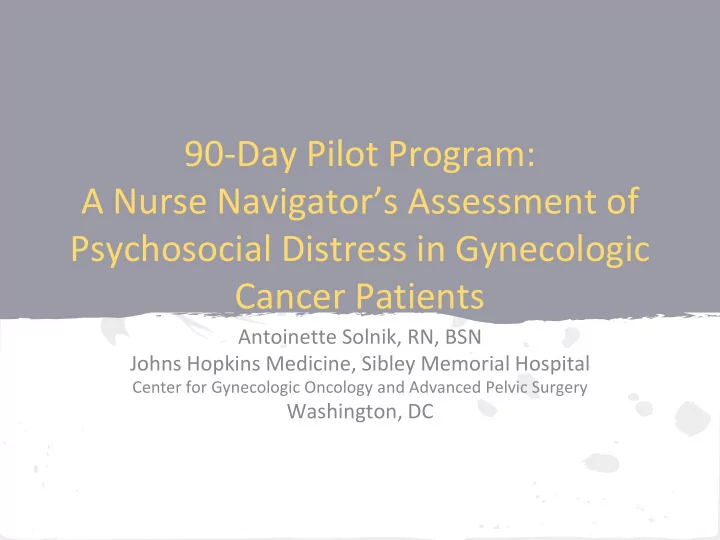

90-Day Pilot Program: A Nurse Navigator’s Assessment of Psychosocial Distress in Gynecologic Cancer Patients Antoinette Solnik, RN, BSN Johns Hopkins Medicine, Sibley Memorial Hospital Center for Gynecologic Oncology and Advanced Pelvic Surgery Washington, DC
NURSE NAVIGATORS wear MANY HATS
Sibley Center for Gynecologic Oncology & Advanced Pelvic Surgery Jeffrey Y. Lin, MD Mildred Chernofsky, Antoinette Solnik, RN, BSN Director, GYN Oncology MD Cancer Nurse Navigator and Gynecologic Surgery Gynecologic Oncologist
100 women were surveyed during the 90-day pilot. • 25% of women indicated a distress score of 0 (with 0 being no stress and 10 being the greatest amount of stress); the nurse navigator learned this might be due to the population at Sibley Hospital with less barriers to care. • More than 50% of women indicated a distress score of greater than 6 were referred to a specialist.
Physical and emotional problems ranked highest among patients above child care, housing, insurance/financial, transportation, work/school and family. ● Patient’s scoring 6 or > were called by the NN within one week of completing the form. ● Physical problems were handled by the NN or referred to lymphedema therapy, palliative care, oncology dietician or hospital chaplain.
Primary physical problems include fatigue, pain and sleep . ● The distress scale opened the door for dialogue between nurse navigator and patient to better communicate both immediate and outer lying issues. ● Referrals to Sibley’s Integrative services and programs such as yoga, meditation, nutrition, acupuncture, support groups and palliative care were made.
Top emotional problems included fear, nervousness and worry . • Emotional problems were due to the uncertainty of diagnosis, worry over cost of care and how individual family members would be affected. • Referral to Sibley’s oncology social worker was an effective next step with some patients.
Lessens Learned: • Timing is key to the administration of the screening tool. • The medical oncology pivotal visit provides the best barometer for a gynecologic patients distress.
Next Steps: • Evaluation of staffing and capacity to effectively respond. • A followup study comparing distress in gynecologic patients with distress in those with breast cancer. • An additional pilot to include screening individual patients at various transitions points in their cancer care.
Sibley Center for Gynecologic Oncology & Advanced Pelvic Surgery Our location: Renaissance Building 4 th floor 5255 Loughboro Road, NW Washington, DC 20016 How to contact us: Referrals & appointments: 202-243-5295 Cancer Nurse Navigator: 202-537-4179 Fax: 202-537-4662
Recommend
More recommend